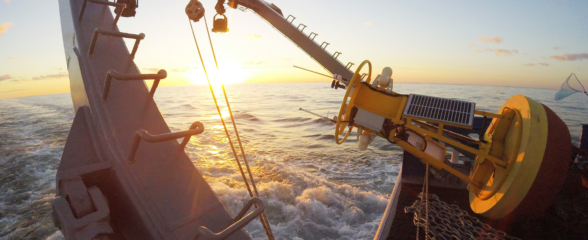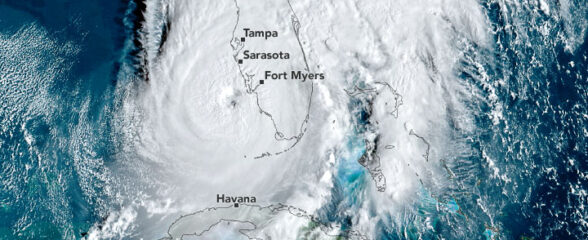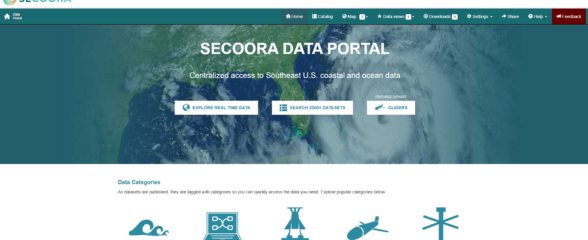
In partnership with the SDRP Advisory Board, the Southeast Coastal Ocean Observing Regional Association (SECOORA) is seeking qualified applicants or subcontracting organizations for the position of Coordinator of the Southeast Disaster Recovery Partnership (SDRP).
Click here for PDF of announcement.
What is the Southeast Disaster Recovery Partnership?
SDRP is a regional platform for connecting disaster recovery and resilience practitioners across North Carolina, South Carolina, Georgia, and Florida, and we are expanding to include Puerto Rico and the U.S. Virgin Islands. The Partnership is made up of state emergency managers, state coastal zone managers, local resilience practitioners, resilience business interests, non-profit organizations, and federal agencies. SDRP enhances resilience in the public and private sectors through building capacity for disaster recovery and facilitating disaster recovery planning. SDRP supports projects implemented by partners, conducts applied research, and hosts the exchange of ideas and best practices. The Partnership was started in 2016, and it has roots in previous regional networks.
Roles and Responsibilities
The Coordinator is responsible for sustaining and growing the Partnership through program development, management, leadership, and outreach. The Coordinator leads coordination, communication and outreach to current and new potential partners. The Coordinator also organizes the annual Southeast and Caribbean Disaster Recovery Workshop, a 2-day workshop that rotates location in the region, and represents the partnership at other conferences. The new Coordinator will guide the partnership as it further defines its strategic vision, goals, and scope of work, with support from the Advisory Committee. There is significant potential to grow and sustain this position in concert with generating new sources of funding for the Partnership. In the past, the Coordinator has supervised a part-time Research and Program Assistant.
Position Structure
This position is currently structured as a half-time position by contract with SECOORA, with funding for 15 months. SECOORA is also willing to structure the Coordinator position as a contract with another organization which directly hires the Coordinator and/or combines the SDRP Coordinator position with another half-time job. Please reach out to Debra Hernandez, Executive Director of SECOORA, at debra@secooraorgpact.wpengine.com, with questions.
The position is remote, with strong preference for someone located in North Carolina, South Carolina, Georgia, Florida, Puerto Rico, or the U.S. Virgin Islands.
Qualifications
- Educational or professional background in disaster recovery, emergency management, or climate resilience
- Three years of relevant experience in a combination of the following:
- Disaster recovery, business continuity, or resilience
- Outreach to government, business, and/or nonprofits
- Grant-writing or other fundraising
- Strategic planning and/or facilitation
- Proven leadership in energizing partners from across different organizations
- Excellent verbal and written communication skills
- Some travel required for workshop, meetings, and conferences (approximately once every other month)
To Apply
Please submit a letter of interest and resume to Debra Hernandez, Executive Director, atdebra@secooraorgpact.wpengine.com, by May 24, 2019.
Related news

Funding Cuts to NOAA IOOS Will Hurt the Southeast
Proposed federal funding cuts would eliminate the IOOS Regional Observations budget for next year. Contrary to the budget Congress has already approved for this year, the Executive Branch wants these proposed cuts to go into effect in 2025.

SECOORA Webinar on the Rapid Intensification of Hurricane Ian: Warm Subsurface Water on the Wide Continental Shelf
Join us Thursday, April 24th at 12 PM ET for the April installment of the SECOORA Coastal Observing in Your Community Webinar Series! This month, we will hear from Dr. Yonggang Liu from the University of South Florida. He will discuss his research on the rapid intensification of Hurricane Ian in relation to anomalously warm subsurface water on the wide...

Webinar: SECOORA Data Portal Demo
Join us on Thursday, February 20, 2025 at 1:00 PM ET to learn more about the SECOORA Data Portal and how to navigate it. Axiom Data Science will be providing an overview of the portal, including how to search the Catalog and make a custom data view.